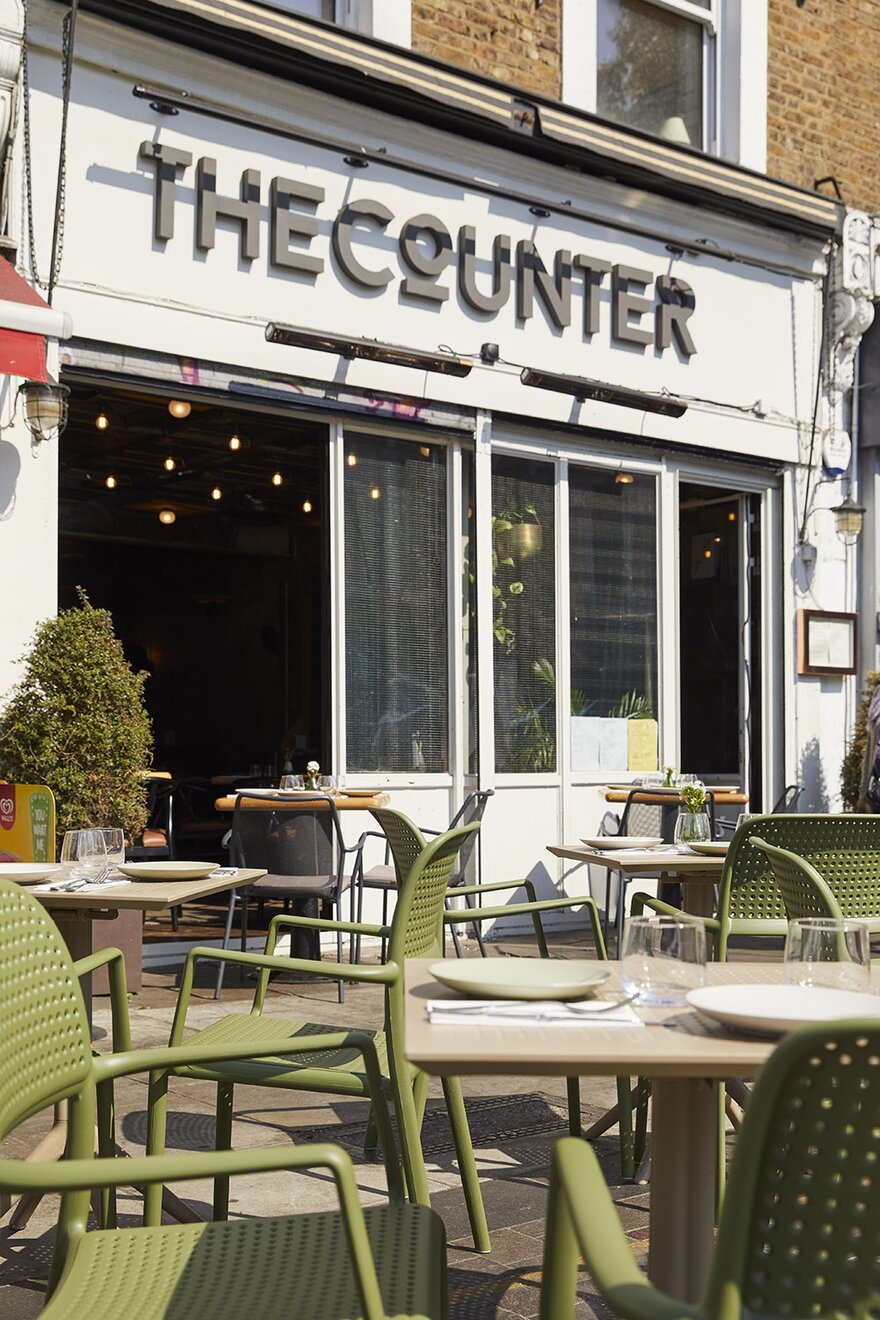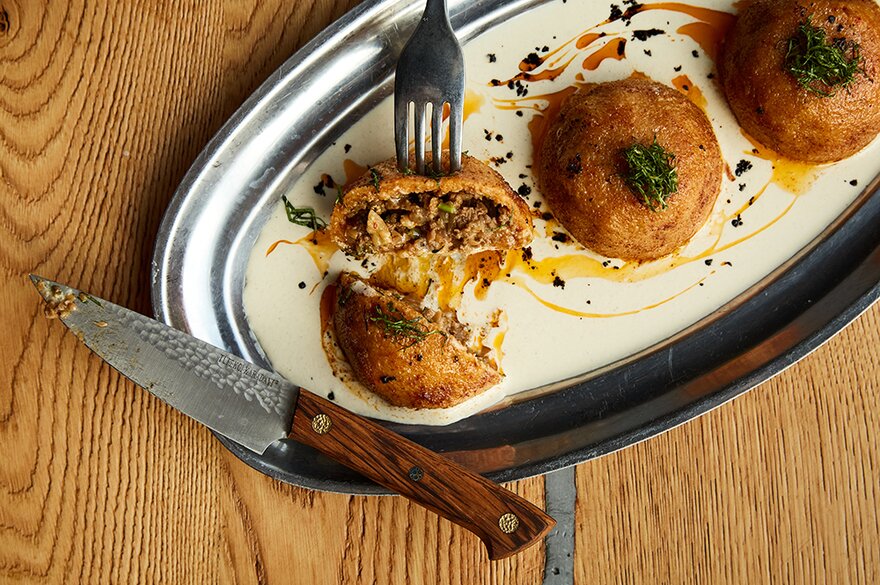The charcoal grills at the Counter represent a return to tradition for Kemal Demirasal. Find out how he says real Turkish food should be served
Kemal Demirasal, chef-founder of the Counter in London's Notting Hill, is being modest when he calls himself a "big surfer". The Turkish restaurateur spent 20 years surfing, moving up the ranks from instructor to operations manager and racer in the national windsurfing championships, which he won six times. It was something he had followed his father into, but in 2007 Demirasal decided to quit: "It was a decision made at very short notice. It was a risk to take, but it paid off."
Over the next decade, taught himself to be a chef. There were no culinary schools for him to enrol in at the time, and he didn't want to consider an apprenticeship, as he was living in Izmir, a quiet, seasonal city on Turkey's Aegean coast. Instead, he spent three winters reading lecture books – close to 1,000 by the end – and cooking every day. In 2009, he opened a "learning curve" restaurant in Turkey, Barbun in Alacati, which was followed by the launch of his first fine dining restaurant, Alancha in Istanbul, in 2013. He also travelled in the Basque country, the Middle East and the Far East for two years, to observe and understand the restaurant trade "from a diner's point of view".
In 2019, Demirasal decided to move to the UK. He launched a test kitchen in Shoreditch, but switched this to a catering business during the pandemic. At the time, he was also consulting for restaurants in Dubai, Kuwait and the wider Middle East. But it was not until after Covid eased that Demirasal took the plunge to open the Counter, his first restaurant outside Turkey, on Golborne Road.
The cosy 45-cover ocakbasi (literally meaning ‘fireside' in Turkish) and bar championing south-eastern Anatolian cooking opened in summer 2022, complete with earthy tones, exposed brickwork and rattan-leather chairs. The eponymous marble-top
counter-cum-chef's-table, which offers guests a full view of the kitchen, is surrounded with cookbooks and bottles of boutique Turkish wine. Metallic sharing plates are matched with rustic pottery, which were created by Demirasal and his wife, who is an artist.
The homely interior design, softened by warm tones and mellow lighting, was a conscious choice. It aims to revive the heritage tradition of intimate ocakbasi dining, which has, over the years, been replaced by a "very masculine" aesthetic, with "white lights and some guys serving the food", according to Demirasal.
"Even in Turkey or around the globe, I have never seen an ocakbasi with sexy appeal. [Ocakbasi owners] migrated to the UK before the 1990s and were grown on UK soil, so they have an idea of what Turkish food is, but I say it's an interpretation of the origin. People here think kebab is just a pile of meat and lots of it, and it shouldn't be," he says.
Traditional ocakbasi restaurants feature charcoal grills, which differ from mangal or open-fire cooking. "If you have a flame, the kebab goes dead because it's a very thin slice of meat. Our cuts are very small so we need caramelisation and heat from a very gentle charcoal – a fire that has passed," he explains. This means that dishes are cooked "in circulation", with chefs pouring charcoal intermittently onto the flames to maintain temperatures.
Meat your maker
The Counter exclusively uses halal meat, not necessarily due to religious reasons, but rather because the lower levels of blood guarantee a specific texture. "It should not be too moist; it should not be too dry. The meat should be crumbly once you put a spoon or fork into it," he explains. The grilled lamp chops (kuzu pirzola) are a case in point: they are succulent, smoky and elegantly tanned, glistening in a drizzle of chimichurri dressing served with couscous pilaf with apricot, mint and pomegranate.
Demirasal recalls how recruiting staff for an ocakbasi restaurant posed some challenges in the early stages, as there were not many chefs who had been trained in this method. It's a relatively new process for Demirasal himself, who installed a wood-fired oven at his previous restaurant, where he also created his own charcoal.
However, ocakbasi has recently become a growing market: "Even non-Turkish chefs that don't originate from this culture are really into it, so having this interest is promising," he says.
Aside from fresh produce, some dairy and meat ingredients are imported directly from Turkey. Details are listed on each table under ‘Our purveyors', and include yogurt from Karystos, pistachio from Gaziantep, early harvest olive oil from the Kalamata region of Greece and pepper paste from Southeast Anatolia.
"Everything goes through customs," he says. "All the herbs, salts, olives, pulses – even pomegranate molasses. The ingredients you find here are really below the quality we have at the origin, so you cannot execute that level of good food with the produce you get here."
The tahini, for example, comes from the Edremit region, which is home to the "producers of the best tahini in Turkey since the 13th century", according to Demirasal. "They were the suppliers of tahini for the Ottoman palace. This is the fourteenth generation of the business. In my restaurant in Turkey, I was using the same produce. If I don't get the same tahini here, I cannot do the same hummus."
He acknowledges the difficulty of balancing the pursuit of culinary authenticity with sustainability. Frankly, for him, "there would be no way to execute this cuisine in UK soil, because we don't have pomegranate molasses or tahini".
Instead, he makes an active effort to enhance the seasonality of his dishes: "I can't use off-season products as a hero dish on the menu. I think 30% of our menu always shifts with the seasons." Subsequently, the winter salad has been switched out for beans and artichokes, while the arrival of summer warrants greater use of watermelons and feta.
He has also developed close relationships with his British suppliers, including a Cornish milk producer, who provides the fluffy clotted cream that sits elegantly on his zesty, syrupy semolina cake.
Despite his both literal and figurative adherence to Turkish customs, Demirasal is hesitant to claim he is an "ambassador" for this cuisine: "That would be like saying I'm the Alain Ducasse of Turkey," he says. "People know we are doing the authentic thing, so I am trying to just do my job, do the right thing and get the right produce."
He modernises where possible, but there are some dishes that have no room for improvement, such as the minced kebab, the lamb liver, the kibbeh and the hummus.
This is not to say that he ever shies away from daring flavour pairings. Take the chocolate baba ganoush, for example, which arose from a "spontaneous idea" of replacing butter with white chocolate because of their similar textures. The melted chocolate is blended with smoked aubergine that has been grilled, peeled and chopped. The mixture is adjusted with smoked salt, lemon, dukkah, dill oil and rose, resulting in a creamy dip with a hint of sweetness.
There are other subtle alterations. His pickle tzatziki (turşulu cacık) with strained yogurt, tarragon oil, pickle juice and sumac is tangier and has "more edge" than the familiar cucumber-based versionversion. He also serves kaymak-style clotted cream with his honey sourdough, which is topped with dukkah, wild thyme honey and truffle oil.
He has recently added seasonal highlights, such as fava beans and artichoke (zeytinyağli taze bakla and enginar), a vegan sharing plate that is cooked in extra virgin olive oil and dusted with salt. It's the sort of dish that reflects the aphoristic simplicity – the unpretentious confidence – of Demirasal's opening words: "When you start a career at a very early age, by middle age you feel like you should move on in your life. But I loved cooking. Because you like, you can do."
Vine leaves recipe
The traditional stuffed vine leaf is a brilliant yet delicate dish, with a couple of elements that are hard to work with. This recipe is a version of it that can be made in one pot, without any need for intricate rolling and stuffing – making it a great option for a family gathering (say at Easter time), and adding a homely and hearty dish to the mix. Out of the whole menu at the Counter, I'd say this is the most suitable recipe for a celebration or special gathering – where a big pot calls for an occasion to match.
Serves 4
- 100g olive oil
- 1 whole white onion (diced)
- 3 garlic cloves (finely chopped)
- 1tbs pepper paste
- 250g bulgur
- 250g vine leaves, drained and washed until the salt brine taste is gone
- 1tsp sumac
- 100g pomegranate molasses
- ½ bunch of fresh dill
- Salt and pepper to taste
- Pomegranates to garnish
- Yogurt to garnish
Add some olive oil to a pot and place over medium heat before sautéeing the onions.
As your onions begin to sweat, add a pinch of salt and pepper followed by the garlic and sauté for another two minutes.
Next, add the pepper paste and continue to cook on medium heat for another three minutes before adding the bulgur and vine leaves.
Sauté all the ingredients for another two minutes before adding hot water (enough to cover the bulgur) and simmer until the bulgur is cooked (when the water evaporates at about 10-12 minutes). Take the pot off the heat and add the sumac, molasses and finely chopped dill before mixing to combine all the elements.
Let this cool until room temperature, before serving on each plate with a spoon of yogurt, eight to 10 pomegranate seeds and a sprinkle of sumac.
If you like you can add some more olive oil to finish, and a drizzle of molasses.
Ot kavurma recipe
Sautéed greens are a very traditional dish from the central Aegean part of Anatolia. People typically forage them from a wide variety of wild herbs and greens and sauté them à la minute, using high-quality extra virgin olive oil. Some choose to use a pepper paste to enhance the flavour, while others keep things simple to achieve as natural a flavour as possible. At the Counter, we make a version of the dish without the pepper paste, enriching the recipe with a bulb of fennel.
Serves 4
- 100g sugar
- 100g walnuts
- Extra virgin olive oil
- 1 fennel bulb (finely sliced)
- Sea salt
- 12 cime di rapa (a substitute to the wild green herb to that we have in the Aegean region of Turkey)
- 12 Swiss chard leaves (stems removed)
- 100g strained Greek yogurt (Maltby & Greekif you can find it)
- Sumac
For the walnut croquant
Melt 100g of sugar until it begins to caramelise. Add the walnuts and coat them in the mixture before setting aside to cool.
Once at room temperature, use a muddler or pestle to break the croquant into smaller flakes and add a pinch of salt to finish.
For the greens
Place your pan on the heat and add a generous drizzle of extra virgin olive oil before sautéing the fennel and adding a pinch of sea salt flakes and sugar.
Once your fennel starts to sweat, add in the cime di rapa, along with another pinch of salt to avoid the mixture going runny.
Next, add the swiss chard leaves and another pinch of salt. The sautéing process should take one to two minutes in total, as we're aiming for the leaves to be al dente.
Drain any excess water from the leaves, before adding an extra dash of olive oil and plating it up.
Add a teaspoon or a tablespoon of strained yogurt, along with a handful of walnut croquant and a pinch of sumac.
Continue reading
You need to be a premium member to view this. Subscribe from just 99p per week.
Already subscribed? Log In












